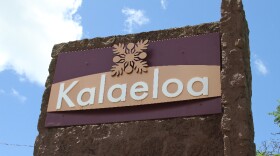Although Hawaiʻi’s state eviction moratorium ended on Aug. 6, most local renters are still protected for another eight weeks under the federal eviction moratorium.
Renters living in communities with a surge in COVID-19 cases can sign a declaration form from the Centers for Disease Control and Prevention to postpone eviction. While most Hawaiʻi residents will be protected until October, there is no guarantee renters will be able to get back on their feet by then.
Women’s rights activist group Af3irm (affirm) is especially concerned about a mass eviction’s effect on women and children.
Women are more likely to be solicited for sexual favors by their landlords or loan officers if they struggle to pay rent. Homeless women and children in Hawaiʻi are often targeted by sex traffickers.
Af3irm has been particularly focused on Kahauiki Village in Honolulu after being alerted by anonymous tenants about possible evictions earlier this month. Kahauiki Village is a plantation-style affordable shelter for homeless families owned by the AIO Foundation.
Af3irm has been reaching out to the female tenants about mediation and rental assistance options.
Act 57, passed by the state Legislature and signed into law by Gov. David Ige this year, requires landlords and tenants to seek mediation before serving eviction notices.
"We acknowledge that providing individuals with access to these very limited resources is not enough to prevent an eviction crisis," said Alex Baldos, a coordinator for Af3irm Hawaiʻi. "We need a systemic commitment to no eviction, especially to the particular development of Kahuiki Village."
Kahauiki Village uses remodeled emergency homes built for victims of the 2011 tsunami in Tohoku, Japan.
The rent is $725 for a one-bedroom unit and $900 for a two-bedroom. Everything is included in the cost — from utility and electricity to 24-hour security service and high-speed internet.
Baldos says that these prices are too expensive for formerly homeless families to reenter society.
But Duane Kurisu, the CEO of AIO Foundation, defends the prices. He says that Kahauiki Village is unlike any other homeless shelter.
Tenants can stay permanently, as long as they pay the rent. It is meant to help homeless families achieve financial independence.
"Kahauiki Village is not a typical community development. We’ve built it for people to get back their lives," Kurisu said.
"As with any private rental, the tenant must be responsible for a lease agreement they sign. And this is all part of empowering each household to develop strategies for sustaining themselves, therefore breaking the cycle of generational homelessness," he said.
Kahauiki Village tenants who do not sign up for government rent assistance programs and cannot pay rent may face eviction after a mediation period — but they will be moved to a transitional home where they can receive help from financial advisors.
Kurisu says there are currently no plans for evictions from the Kahauiki Village.







